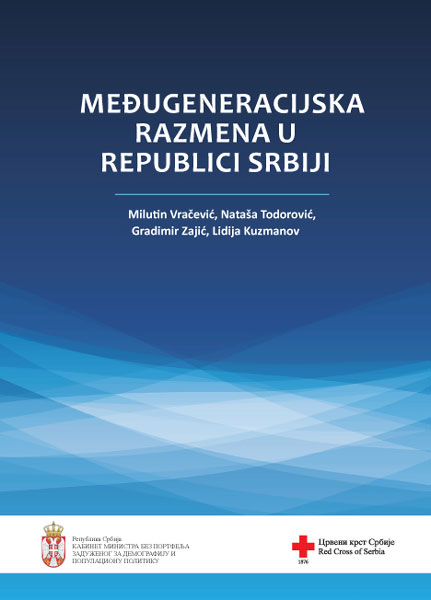Intergenerational exchange in the Republic of Serbia

In order to assess the characteristics and volume of intergenerational exchange in the republic of Serbia, the Red Cross of Serbia has during December 2018 and January 2019 implemented a research study on the volume and contents of intergenerational exchange. 753 persons from three generations across ten cities in Serbia participated in the research. The “Intergenerational Exchange” project was implemented with financial support of the Office of the Minister without portfolio responsible for demographics and population policy.
Demographic data shows that across the globe, as well as in Serbia, the share of older people in the population is on the rise and this also increases the needs for care. In 2017 the share of persons over the age of 65 was 19.17% and the share of persons over the age of 80, according to the same statistics was 4.33%.It is expected that by 2040 the share of persons over the age of 65 in Serbia will increase to 25% and that the share of those over 80 will by 2020 increase to 4.73%, by 2030 to 5.67% and by 2040 to 7.44%. Large part of care that older people receive comes from within their families, through intergenerational exchange. Thus it is important to have in mind the trend of rising share of older people and declining share of younger people I the population as this will directly impact the capacities for the needs for care to be met. Intergenerational exchange and intergenerational solidarity are therefore, needed more than ever. Promoting intergenerational exchange and solidarity is important in building cohesive and solidary society where persons of all ages will have equal opportunities.
In order to build a cohesive society, data on exchange within families is needed, as is on the needs of different generations.
The research data shows that at this moment 37.6% of older people in Serbia has difficulties in independently performing the activities of daily life in their homes and older people are 15% of the beneficiaries of the institutional social welfare services, non-institutional social welfare services and relevant financial support – which is lower than their share in the total population. It is estimated that only 4.5%-6.9% of older people are covered by some of these services as well as that 90% of older people in Serbia relies on family support to a large extent. The need for support in one’s home increases with age: in the research 11.6% of young people, 13.8% of middle-aged people and 46.2% of older people stated that they need such support. Based on the research it can also be recognised that the percentage of unmet need is higher for women than for men: 9.4% of participating women say that they need direct support (5.2% receive it), 5.2% of men say that they need direct support (3% receive it). Also, 7.7% of interviewed men say they need support with childcare (6.3% receive it) and 7.2% of women say they need support with childcare (4.9% receive it).
The most frequent form of intergenerational exchange in relation to services and time is providing assistance with housework: 13.1% of the participants receive it regularly and 4.2% occasionally. It is followed by assistance with transportation: 9.6% receive it regularly and 6% receive it occasionally.
As for the time and value of the work invested through intergenerational exchange, on the average the participants that confirmed they do receive support were receiving it for 73 hours per month for assistance with housework (monetary equivalent of 19,949 RSD going by market prices), 52 hours per month for assistance with work around the house (equivalent of 14,210 RSD), 23 hours per week for transport and assistance with shopping (equivalent of 5,457 RSD), 40 hours per month for direct assistance (equivalent of 15,484 RSD) and 140 hours per month for assistance with childcare (equivalent of 57,221 RSD).
As for financial support, average monthly amount of received monetary support is 17,624 RSD and the average amount of one-time financial support received in the last twelve months is 31,068 RSD. As for giving, the average amount of regularly provided financial support is 18,203 RSD and the average amount of one-time provision of financial support in the last 12 months is 21,573 RSD.
Based on the research data, older people are more likely to receive services and younger and middle-aged people are more likely to receive financial support. For young people this is pocket money (36% of those that confirmed they are receiving support), support for education (26%), paying for vacation, hobby or other pastime (26%) and for middle-aged people this is mostly loans (14% of those that confirmed receiving support) and co-financing the fees for services such as kindergarten, retirement home, boarding school etc. – 6%).
Intergenerational exchange in Serbia is, based on this research, is intense and frequent. It includes all generations including older, middle and youngest generations and it goes in all directions. In Serbia participation in intergenerational exchange happens in all phases of the life course and a rather significant number of people – one quarter of the research sample – would not be able to perform daily activities were it not for this kind of support, whether from the family members sharing the same household, or family members living separately. As the largest part of support is related to housework, followed by transport and shopping support, it is clear that some of the fundamental activities of independent life are very much reliant on availability of this kind of support. Estimating the value of the received services by looking at their market prices shows that at monthly level the value of received support services exceeds the amount of minimal pension and the average age of received one-time financial support is double the amount of minimal pension in Serbia.
The research shows that it is necessary to work on creation of conditions to maintain and further develop intergenerational exchange and thus recommendations were created to improve public policy and practice.
